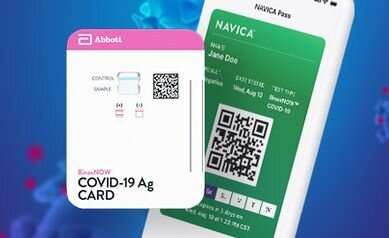Credit: Abbott Laboratories
A $5 test that detects COVID-19 from a nasal swab within 15 minutes—and has been evaluated in a clinical trial at the University of Rochester Medical Center (URMC)—has received FDA Emergency Use Authorization for use by doctors, nurses, school nurses, pharmacists and other health care providers.
"This is really exciting," says Kian Merchant-Borna, M.P.H., M.B.A., faculty in the Department of Emergency Medicine, who is the site principal investigator of the study and of the Emergency Medicine Industry Sponsored Research Program. "Eventually, anyone in their home will be able to use this, before you send your children off to school, or before you go to visit your grandparents. It's the same technology as a urine pregnancy test, and just as easy to use."
The Abbott BinaxNOW COVID-19 Ag Card Point of Care (POC) diagnostic test, which is the size of a credit card and detects the presence of COVID-19 antigens, also provides a free phone app for persons who receive a negative result. The app will display a temporary encrypted digital health pass via a QR code (similar to an airline boarding pass). Businesses, schools, and other organizations will be able to view and verify the information on a mobile device.
URMC was one of 19 universities involved in testing the system, and so far has enrolled more than 150 participants, the largest number across all sites, Merchant-Borna says. Participants were chosen from adults who presented to the Strong Memorial Hospital Emergency Department, and either tested positive for COVID-19 or were suspected to be infected with coronavirus (SARS-CoV-2).
Results of the testing from all 19 sites indicated that the test correctly diagnosed a coronavirus infection 97.1 percent of the time (sensitivity of 97.1%) and correctly returns a negative test result 98.5 percent of the time (specificity of 98.5%). Merchant-Borna says "this far exceeded what anyone expected from a lateral flow test."
While RT-PCR (reverse transcription polymerase chain reaction) testing directly detects viral nucleic acid, antigen tests detect pieces of viral proteins. An advantage of antigen testing is that it does not require sophisticated equipment, trained technicians, or longer processing time. "With a rapid test like this, results are near immediate, getting infectious individuals isolated and preventing further spread of the virus" says Merchant-Borna.
For the Abbott BinaxNOW platform, a healthcare worker opens a test card and lays it flat on a countertop. Extraction reagent is added to a nasal swab collected from the patient, and within 5 to 15 minutes reads the result based on the presence or absence of visually detectable blue-colored lines.
Abbott already uses the same "lateral flow technology" to test for strep, malaria, influenza and other diseases, so was adapting an already proven technology, Merchant-Borna says.
Company officials say they will ship "tens of millions of tests" for COVID-19 this month, ramping up to 50 million tests a month at the beginning of October. While noting the performance of antigen testing is not as sensitive or specific as RT-PCR, UR Medicine may evaluate how such testing could complement and enhance existing testing capacity for defined situations in the future.
Merchant-Borna praised the University's Office of Research and Project Administration and the Medical Center's Institutional Review Board for quickly paving the way for the University to participate in the testing. "What normally takes about 3 weeks to process we did in about 8 hours," Merchant-Borna says. "I think that really speaks to the institution's awareness for how important this project was."
More information: Abbott BinaxNOW COVID-19 Ag Card Point of Care (POC) diagnostic test: www.abbott.com/corpnewsroom/pr … antigen-testing.html
Provided by University of Rochester
























